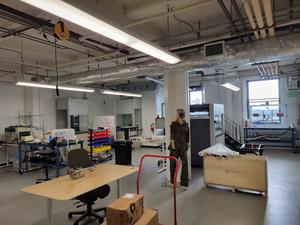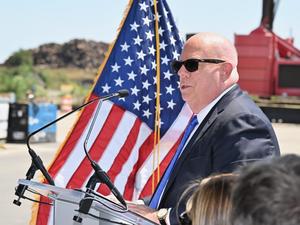![CB Headshot 2[48] copy](https://media.bizj.us/view/img/12344904/cb-headshot-248-copy*540xx1868-1051-26-0.jpg)
Pixelligent Technologies secured a $1.9 million grant from the federal government, part of the company's wider pivot toward diversifying the use of their nanotechnology away from lighting into a variety of industries.
The U.S. Department of Energy grant will help speed the commercialization of the Baltimore company’s new lubricants that use nanocrystals to improve the performance, energy efficiency and the lifetime of a variety of machines, including wind turbines and electric vehicles. The nanotechnology attaches to a bearing or other technology, creating a film that makes a lubricant last longer and functions as an extra layer of protection if the lubricant does break down.
Pixelligent previously focused on products to improve LED lights but the company shifted its strategy in response to increasing competition from other markets, such as China. CEO Craig Bandes said the company is now focusing on a wider array of industries, such as the extended reality space by creating products that help create a crisper image in a virtual reality headset, along with smartphone displays and clean energy products like the lubricant they are designing through the DOE grant.
Along with shifting away from purely focusing on LED lights, Pixelligent is also creating fully formulated products for customers, instead of additives to a customer's existing manufacturing process. Alongside working on the lubricant product through the DOE grant. The company created its first line of completely formulated products, PixNil, to improve optical devices, in 2021.
"Up until 2019, our business model was just making additives," Bandes said. "And it was just taking way too long to get big commercial wins."
The lubricant may seem out of step with the company’s focus on improving the quality of screens, but it uses the same basic technology that Pixelligent uses to improve digital displays, creating an entry into an entirely different market without requiring them to massively change their in-house manufacturing processes, President Craig Bandes said.
Bandes plans to have a commercial launch for lubricant in the next 18 months. The 40-person company has raised a substantial amount of funding in the past, including $7.6 million in 2018.
The company said it came up with the idea for a lubricant through the insight of a key angel investor who worked at ExxonMobil. That investor pointed out that the oil and gas company, who is now a commercial testing partner with Pixelligent, had been working on nanoparticle technology for some time. Bandes then began looking for government dollars to fund the early-stage, high-risk research and development. The most recent grant is a follow-up to a $1.5 million grant from the DOE in 2020.
“We already have plenty of manufacturing capacity at our manufacturing plant in Baltimore,” Bandes said. “So it's not about setting up manufacturing lines, it's more about bringing this new formulator product in a lubricant to market.”









